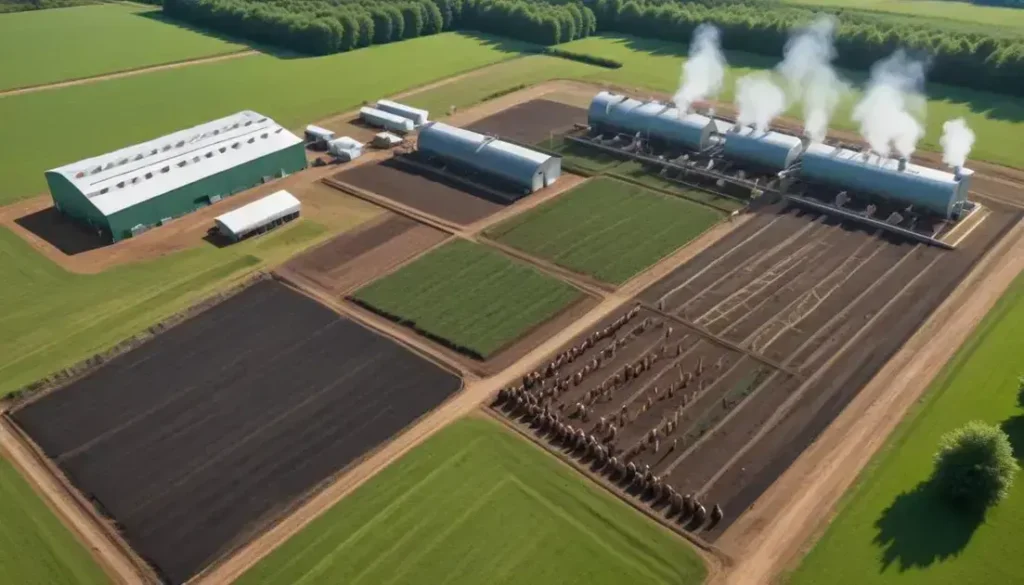Sustainability in agriculture involves practices that reduce environmental impact, enhance productivity, and improve soil health, utilizing technologies like precision agriculture and regenerative methods to meet evolving consumer demands and regulatory standards.
Have you considered how sustainability in agriculture can transform businesses? Bunge is leading the charge by implementing innovative strategies to reduce farming’s environmental footprint.
Bunge’s commitment to sustainable agriculture
Bunge’s commitment to sustainable agriculture is not just an initiative; it reflects a fundamental shift in how agriculture is approached globally. The company emphasizes innovative practices designed to enhance productivity while minimizing environmental impact. This includes the adoption of modern techniques that reduce farming emissions significantly.
Through its various programs, Bunge is encouraging farmers to embrace regenerative agriculture, which focuses on rebuilding soil health and increasing biodiversity. These methods not only sustain the land but also contribute to the long-term profitability of farming operations. By working closely with farmers, Bunge implements traceability solutions that allow consumers to know where their food comes from, enhancing transparency in the supply chain.
The company’s partnerships with various stakeholders are essential for fostering sustainable practices. Collaborating with environmental organizations and regulatory agencies ensures that Bunge stays ahead of emerging sustainability standards. As the agricultural sector evolves, Bunge’s proactive measures help to establish a more resilient farming ecosystem, benefiting both the environment and agricultural communities.
Impact of farming emissions on global markets
The impact of farming emissions on global markets extends far beyond environmental concerns. Agricultural activities contribute significantly to greenhouse gas emissions, which can disrupt market stability. As consumers become more aware of sustainability issues, they increasingly prefer eco-friendly products, prompting businesses to adapt.
Farming emissions not only affect the farmer’s bottom line but also influence pricing and demand in related industries. For instance, crops that require high greenhouse gas outputs may see reduced demand as retailers focus on sustainable sourcing. This shift nudges producers to adopt greener practices, ensuring their products remain competitive.
The global market response to emissions has led to regulatory changes, pushing many countries to implement stricter environmental policies. These regulations impact import and export dynamics, as countries with rigorous standards may establish trade barriers against those that do not comply. Consequently, farmers worldwide must navigate these challenges to maintain access to lucrative markets.
Furthermore, investment in sustainable agriculture technologies is rising. Companies and governments are increasingly funding initiatives aimed at reducing farming emissions. This trend not only bolsters the industry but also supports the fight against climate change, making agricultural sustainability a priority for future markets.
Traceability programs in Canada
Traceability programs in Canada have become pivotal for enhancing food safety and ensuring transparency in the agricultural supply chain. These initiatives allow consumers to track the journey of their food products from farm to table, fostering greater confidence in food quality.
Public and private sector collaboration is essential in establishing effective traceability standards. Canadian farmers and businesses are increasingly adopting technologies that enable precise tracking of products. This is not only beneficial for consumer assurance but also aids in compliance with regulatory requirements.
With advancements in blockchain technology, traceability systems are becoming more robust. This technology allows for secure and immutable records, making it easier to pinpoint issues in the supply chain if they arise. By implementing such innovative solutions, Canadian agriculture is positioned to meet both domestic and international market demands.
Furthermore, these programs help reduce waste and inefficiencies within the supply chain. By having detailed information about each product, businesses can optimize their operations and respond quickly to potential recalls or safety concerns. The commitment to traceability not only enhances food safety but also supports sustainable agricultural practices, promoting a more responsible food system.
Regenerative agriculture initiatives
Regenerative agriculture initiatives focus on restoring and enhancing the health of ecosystems while improving agricultural productivity. This approach sees farming as a vital component of the ecosystem, promoting biodiversity and soil health through sustainable practices. Techniques such as cover cropping and crop rotation play crucial roles in these initiatives.
By implementing regenerative methods, farmers can decrease their reliance on chemical inputs, ultimately leading to healthier soils and more resilient crops. This shift not only benefits the environment but also contributes to better food quality and yield. Regenerative practices help sequester carbon in the soil, combating climate change, which is increasingly vital in today’s agricultural landscape.
Moreover, many regenerative agriculture initiatives emphasize community involvement and knowledge sharing. Through programs and workshops, farmers can learn from one another and adopt best practices that are suitable for their specific regions. Building a community around shared goals fosters innovation and supports local economies.
Support for regenerative agriculture is also growing among consumers who are increasingly concerned about the origins of their food. As demand for sustainable and responsibly produced food rises, farmers engaged in regenerative practices are likely to find new market opportunities, reflecting a broader shift towards sustainable food systems.
Collaboration with global organizations
Collaboration with global organizations is essential for advancing sustainability in agriculture. Such partnerships enable farmers and businesses to access valuable resources and expertise that enhance their sustainable practices. Global organizations often provide technical assistance, funding, and training programs that are vital for building capacity in local farming communities.
Through these collaborations, stakeholders can share best practices and innovate solutions that address common challenges, such as climate change and resource scarcity. Initiatives led by organizations like the Food and Agriculture Organization (FAO) prioritize the sharing of knowledge and technology, which empowers farmers worldwide to adopt efficient and sustainable farming techniques.
Moreover, these partnerships help in developing comprehensive frameworks that incorporate environmental, social, and economic dimensions of sustainability. By aligning with global standards, Canadian farmers can ensure compliance while also benefiting from international market access. This alignment helps improve overall trust in Canada’s agricultural exports.
Incorporating diverse perspectives from international partners also stimulates innovation, contributing to a more resilient agricultural sector. Collaborative efforts not only address immediate issues but also pave the way for long-term sustainability goals, fostering a unified approach to global food security.
Measuring sustainability goals
Measuring sustainability goals is crucial for assessing the impact of agricultural practices on the environment and society. Farms and companies engaged in sustainable agriculture need clear metrics to evaluate their progress and hold themselves accountable. By developing specific key performance indicators (KPIs), they can track improvements in areas like biodiversity, soil health, and resource usage.
These measurements help identify strengths and areas for improvement in sustainable initiatives. Tools such as carbon footprint calculators and soil health assessments are invaluable for providing insights into environmental impacts. Regular monitoring allows farmers to make informed decisions that enhance their sustainability efforts and address any shortcomings.
Moreover, consumer demand for transparency makes it essential for companies to report their sustainability metrics publicly. This practice builds trust with consumers who are increasingly looking for responsibly sourced products. Clear reporting protocols can further align agricultural practices with global sustainability targets, such as those set by the United Nations Sustainable Development Goals (SDGs).
Engaging in sustainability goal measurement also fosters collaboration among stakeholders. Sharing results with industry partners, NGOs, and government agencies helps create a collective understanding of the challenges faced in achieving sustainability and encourages shared solutions.
Future of sustainable practices in Canada
The future of sustainable practices in Canada looks promising as farmers and businesses increasingly embrace environmentally friendly methods. With a strong emphasis on sustainability, the agricultural sector is evolving to meet the demands of both consumers and regulatory bodies. The advancements in technology, such as precision agriculture, are becoming more prevalent, allowing farmers to optimize resource use while minimizing environmental impact.
Innovations in soil health management, crop rotation, and integrated pest management are gaining momentum. These practices enhance biodiversity and aid in sequestering carbon, contributing to Canada’s commitment to combating climate change. Furthermore, the rise of agri-food technology startups is fostering new ideas that support sustainable practices in farming.
Government support plays a vital role in shaping the future of sustainability. Policies focused on funding for sustainable projects and incentives for adopting green practices create an encouraging environment for farmers. Collaborative efforts among various stakeholders, including NGOs and industry partners, facilitate knowledge sharing and innovation.
As consumer awareness of environmental issues grows, the demand for sustainable products will increase. Farmers who adopt sustainable practices are likely to find new market opportunities, ensuring their businesses thrive while contributing to a more sustainable future for Canada’s agricultural landscape.
In Summary: Embracing Sustainability in Agriculture
The journey towards sustainability in agriculture is vital for the future of our planet. By adopting innovative practices, farmers in Canada can significantly reduce their environmental impact while meeting the needs of consumers.
Through collaboration with global organizations and the use of technology, Canadian agriculture is moving towards a more sustainable model. Measuring sustainability goals and sharing knowledge are essential components of this transformation.
As we look ahead, it is clear that sustainable practices will not only benefit the environment but also enhance the resilience and competitiveness of Canadian farmers. Investing in these methods is an important step towards a healthier planet and a thriving agricultural sector.
Ultimately, by embracing sustainability, we can ensure a better future for generations to come.
Frequently Asked Questions (FAQ)
What are sustainable agricultural practices?
Sustainable agricultural practices are methods that aim to reduce environmental impact while improving productivity and soil health. These practices include crop rotation, organic farming, and conservation tillage.
How does technology enhance sustainable farming?
Technology enhances sustainable farming by providing tools for precision agriculture, which helps farmers optimize resource use, reduce waste, and improve yields.
Why is measuring sustainability goals important?
Measuring sustainability goals is important because it allows farmers and organizations to track their progress, identify areas for improvement, and ensure compliance with environmental standards.
What role do global organizations play in sustainable agriculture?
Global organizations provide support through funding, knowledge sharing, and technical assistance, helping farmers adopt sustainable practices and meet international standards.
How can consumers support sustainable agriculture?
Consumers can support sustainable agriculture by choosing locally produced, organic, and ethically sourced products, which encourages farmers to implement environmentally friendly practices.
What is regenerative agriculture?
Regenerative agriculture focuses on restoring soil health, enhancing biodiversity, and promoting sustainable farming practices that can lead to improved ecosystem services and food production.


